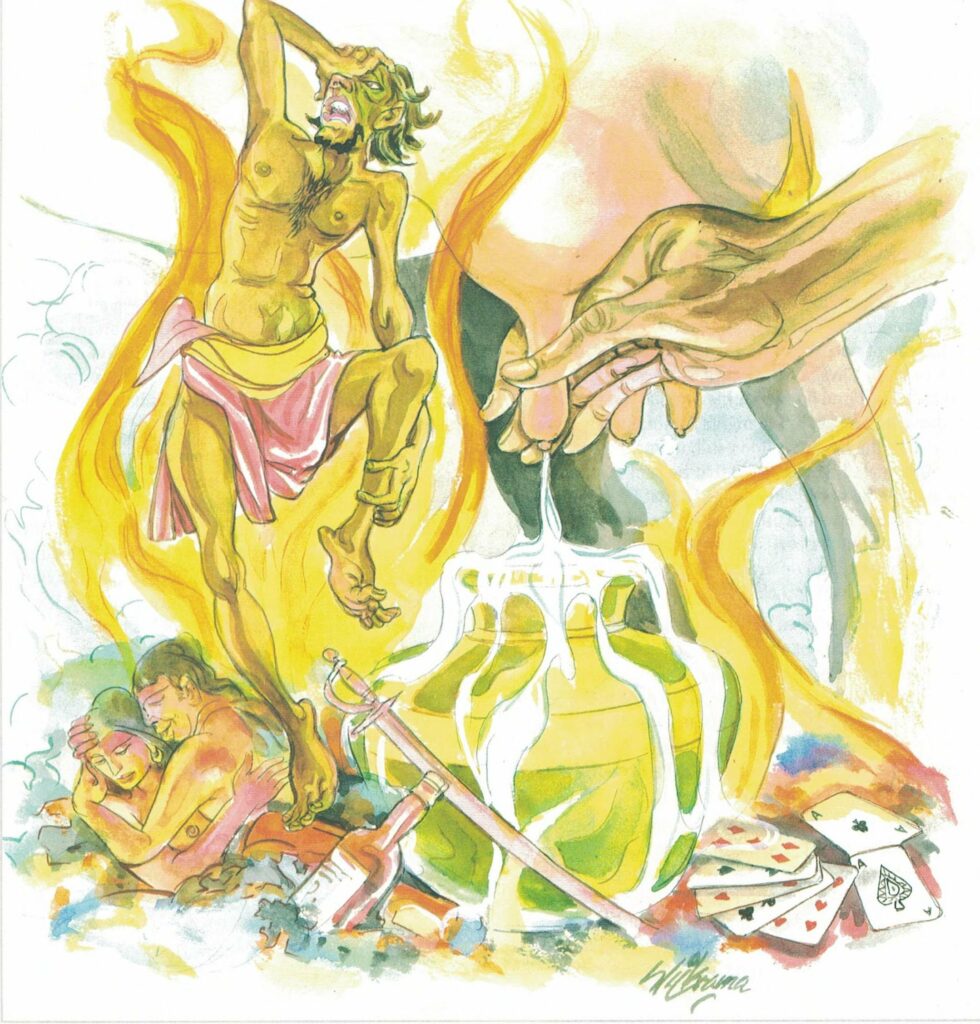Pali text, illustration and English translation of Dhammapada verse 71:
na hi pāpaṃ kataṃ kamma sajju khīraṃ’va muccati |
ḍahantaṃ bālamanveti bhasmacchanno’va pāvako || 71 ||
71. As milk, is evil kamma done, so slowly does it sour. Smouldering does it follow the fool like fire with ashes covered.

The Story of Snake-Ghost
While residing at the Jetavana Monastery, the Buddha spoke this verse, with reference to a snake-ghost.
One day, in the midst of a thousand ascetics wearing matted hair, the Venerable Lakkhana and the Venerable Moggallāna the great descended from Vulture Peak with the intention of making an alms-pilgrimage in Rājagaha. The Venerable Moggallāna, seeing a snake-ghost, smiled. Thereupon Venerable Lakkhana asked him the reason for his smile, saying, “Brother, it is not the proper time for you to ask that question. Wait until we are in the presence of the Buddha and then ask me.” When they had completed their rounds for alms in Rājagaha and had come into the presence of the Buddha and had sat down, Venerable Lakkhana asked Venerable Moggallāna, “Brother Moggallāna, as you were descending from Vulture Peak, you smiled; and when I asked you the reason for your smile, you said, ‘Wait until we are in the presence of the Buddha and then ask me.’ Now tell me the reason.”
Said the monk, “Brother, I smiled because I saw a snake-ghost. This is what he looked like: his head was like the head of a man, and the rest of his body was like that of a snake. He was what is called a snake-ghost. He was twenty-five leagues in length. Flames started from his head and went as far as his tail;flames started from his tail and went as far as his head. Flames of fire starting from his head played on both sides of his body; flames of fire starting from his sides descended on his body. There are two ghosts, they say, whose length is twenty-five leagues, the length of the rest being three-quarters of a league. But the length of this snake-ghost and of this crow-ghost was twenty-five leagues.”
Moggallāna saw a crow-ghost and he asked the ghost about his former deed. The ghost said, “In a former state of existence I took three mouthfuls of food meant for venerables. As a result of that misdeed, when I died, I suffered torment in the Avīci Hell and thereafter, because the result of my evil deed was not yet exhausted, I was reborn on Vulture Peak as a crow-ghost. Now, because of my deed, I endure this suffering.”
The story of the snake-ghost also was related. Now a certain resident of Benares was plowing a field near the wayside, and the people who passed through his field to see the solitary Buddha, trampled his field. The farmer tried to prevent them from doing this. But he was unable to prevent them. Finally, after the solitary Buddha had entered the city for alms, the farmer broke all his vessels for eating and drinking and set fire to his grass and leaf shelter. Then the people cried out, “Seize him!” They killed him. He was born in the Avīci Hell and later, he was reborn on Vulture Peak as a snake-ghost.
At this point, then, the monk said, “I smiled because I saw a snake-ghost.” Straightaway the Buddha arose and witnessed to the truth of Moggallāna’s statement, saying, “Monks, what Moggallāna says is the truth. I myself saw this very ghost on the day I attained enlightenment. But out of compassion for others, I did not say, ‘As for those who will not believe my words, may it be to their disadvantage.’”
Explanatory Translation (Verse 71)
khīraṃ iva kataṃ pāpaṃ kammaṃ sajju na hi muccati
bhasmacchanno pāvako iva ḍahaṃ taṃ bālaṃ anveti
khīraṃ iva: like milk; kataṃ pāpaṃ kammaṃ [kamma]: the evil acts committed; sajju: immediately on being extracted; na hi muccati: certainly does not curdle; bhasmacchanno pāvako iva: like sparks of fire concealed by ashes; ḍahaṃ [ḍaha]: burning; taṃ bālaṃ [bāla]: that evil doer; anveti: pursues
When an ignorant person commits an act of sin, it does not immediately yield bad results. This is just like the freshly extracted milk, which does not curdle immediately on being extracted from the cow’s udder. The sin that has been committed remains concealed like the sparks covered with ashes, and continues to follow and burn the doer of sins.
Commentary and exegetical material (Verse 71)
sajju khīraṃ iva muccati: the milk does not curdle immediately on being extracted. The milk has to undergo certain processes before it curdles. It is the same thing with the sinful act. It does not begin to show its evil results until later. Because the process is long-drawn, the sinner cannot immediately see the evil effect of his action. This makes him commit evil without seeing the harmful results it will bring in the future.